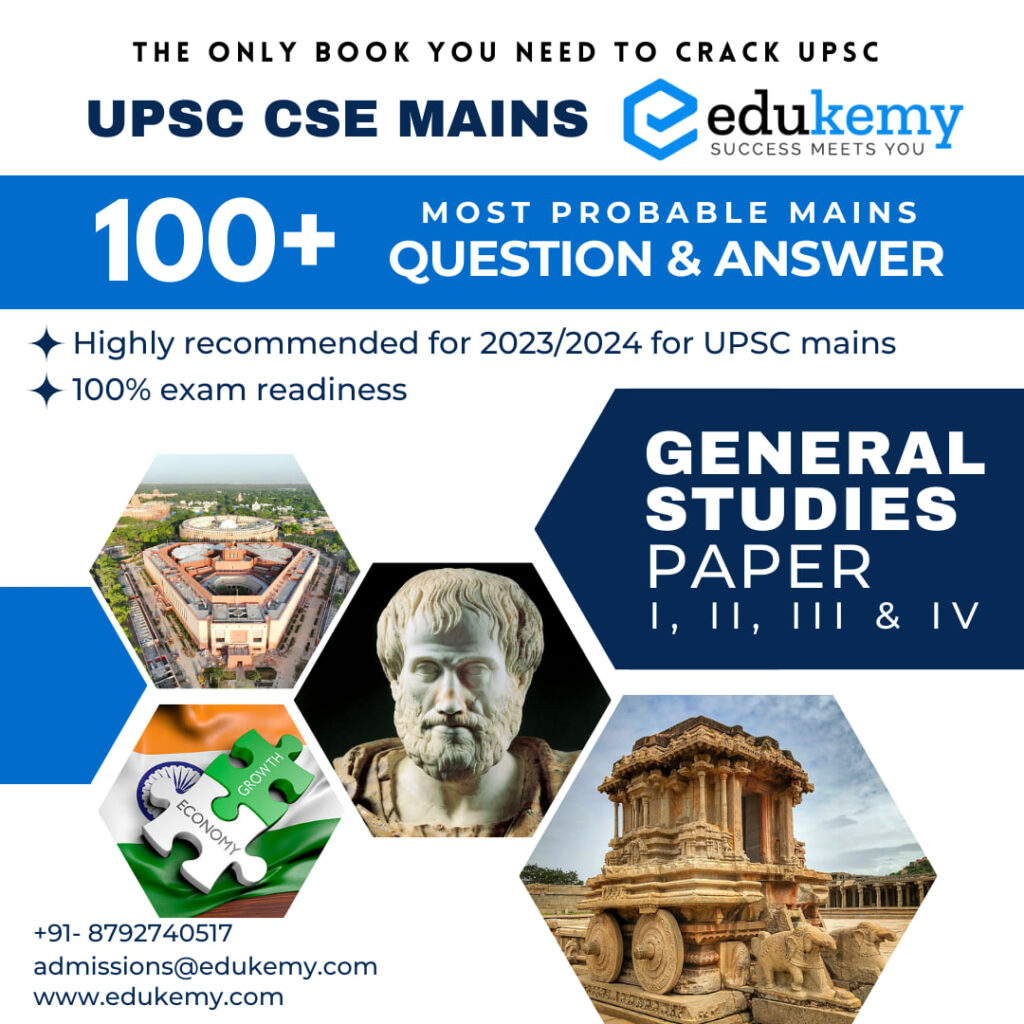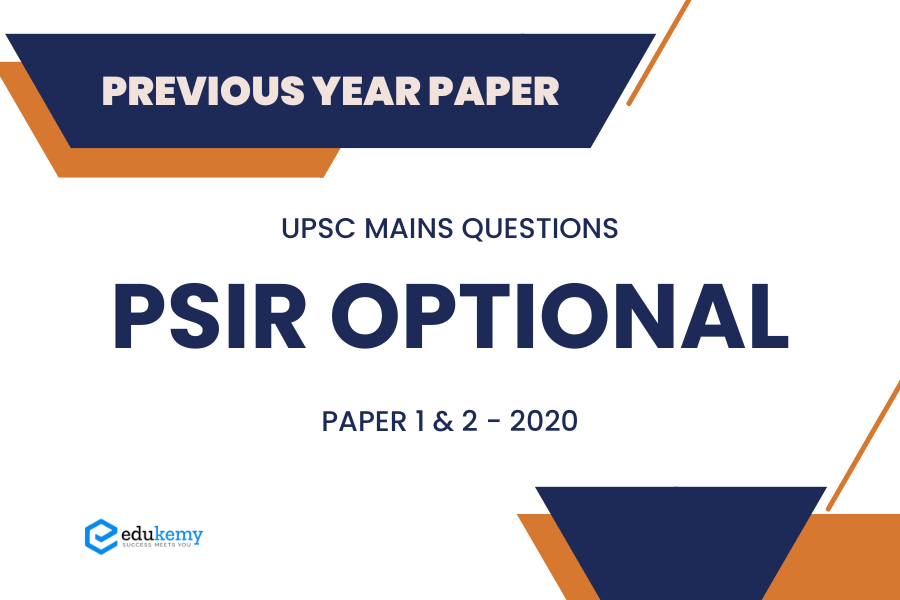

The Union Public Service Commission (UPSC) Main Examination is a pivotal stage in the journey of civil services aspirants in India. Among the various optional subjects offered, Political Science and International Relations (PSIR) stands out as a popular choice for its interdisciplinary nature and its relevance to the dynamics of governance and global affairs. Aspirants opting for PSIR delve into the intricate realms of political theory, comparative politics, and international relations. To prepare effectively for the PSIR optional paper in UPSC Mains, one invaluable resource is the analysis of previous year papers. These papers serve as a roadmap, offering insights into the exam pattern, question types, and the depth of knowledge required. A careful examination of these papers not only aids in understanding the evolving trends in UPSC examinations but also equips aspirants with the essential skills to navigate the challenges posed by the PSIR optional. In this context, delving into the previous year papers becomes an indispensable aspect of strategic preparation, fostering a comprehensive understanding of the subject and enhancing the prospects of success in the UPSC Main Examination.
Contents
- 1 Paper – 1
- 2 Paper – 2
- 3 Frequently Asked Questions (FAQs)
- 3.1 Q1: How important is the role of previous year papers in preparing for UPSC Mains with Political Science and International Relations optional?
- 3.2 Q2: How should one approach answer writing in UPSC Mains for Political Science and International Relations optional, considering the diverse nature of topics?
- 3.3 Q3: Are there any specific strategies to revise Political Science and International Relations optional subjects before the UPSC Mains exam?
Paper – 1
Section – A
Q1. Comment on the following in about 150 words each :
- (a) Post-colonial theory of the state
- (b) Equality of opportunity
- (c) Liberalism as a revolutionary idea
- (d) Ambedkar’s ideas on constitutionalism
- (e) Machiavelli’s secularism
Q2.
- (a) Make a comparative assessment of Greek perspective of Justice with the Rawlsian concept of Justice.
- (b) Representative democracy means the people as a body must be able to control the general direction of government policy. (J. S. Mill). Comment
- (c) Assess the significance of right to property in political theory.
Q3.
- (a) Explicate the ideological components of Gandhism.
- (b)Examine the nature and meaning of power.
- (c) Explain the sources of ancient Indian political thought.
Q4.
- (a) Trace the evolution of Western Political Thought from ancient to contemporary period.
- (b) Discuss the significance of a normative approach to Political theory.
- (c) Discuss Karl Marx’s concept of class.
Section – B
Q5. Answer the following in about 150 words each:
- (a) Role of Socialists in Indian National Movement
- (b) Indian constitution makers’ concerns on social inequality
- (c) Right to constitutional remedies in India
- (d) Judicial overreach in India
- (e) Mechanism for settling inter-state disputes
Q6.
- (a) Examine the role and functioning of the Election Commission of India and the Comptroller and Auditor General in the last two decades.
- (b) Trace the role of militant and revolutionary movements in the Indian national movement.
- (c) To what extent has the 73rd and 74th amendments of the Indian Constitution enhanced women’s empowerment?
Q7.
- (a) Does the functioning of federalism in India tend to make it appear as a unitary state in practice?
- (b) Has the thrust of government tilted towards the executive in contemporary Indian Politics? Give your arguments.
- (c) ‘Liberalisation of Indian Economy has not been accompanied with adequate reforms’. Comment.
Q8.
- (a) To what extent has the inadequate intra-party democracy affected the functioning of Indian Democracy?
- (b) Examine the role of religion in Indian Electoral Politics in the contemporary times.
- (c) Examine the nature of the civil liberty movement in India.
Paper – 2
Section – A
Q1. Answer the following in about 150 words each:
- (a) Discuss the subject matter of comparative politics. Outline the limitations of comparative political analysis.
- (b) Analyze the contribution of liberal democratic principles in the democratization of Indian polity.
- (c) Has the increased participation of the underprivileged in the political process of developing societies strengthened democracy or created political chaos and conflict? Comment.
- (d) Critically examine the impact of the process of globalization from the perspective of the countries of the Global South.
- (e) What are the core assumptions of idealism as an approach to study International Relations? Explain its continuing relevance in peacebuilding.
Q2.
- (a) Explain the concept of balance of power. What are the various techniques of maintaining a balance of power?
- (b) Enumerate the challenges in the operation of the principles related to collective security in the UN Charter.
- (c) Critically analyze the implications of Sino-American strategic rivalry for the South and South-East Asian region.
Q3.
- (a) Discuss the ways to strengthen the Non-Aligned Movement (NAM) to enable it to address the challenges faced by developing countries.
- (b) Critically evaluate the role of the United States of America in the World Trade Organization (WTO) dispute settlement mechanism and its implications for the future of the WTO.
- (c) Explain the significance and importance of the demand raised by the developing countries for a New International Economic Order (NIEO). Are they likely to achieve their objectives of NIEO in the foreseeable future?
Q4.
- (a) Discuss the significance and urgency of the UN Security Council reforms. Explain the relevance of the reform proposals made by the UN Secretary-General António Guterres for the developing countries.
- (b) Critically analyze the role of ASEAN in the promotion of regional peace and security through economic cooperation and trade.
- (c) Examine the role of the United Nations Framework Convention on Climate Change (UNFCCC) and other major efforts by the UN to address the global environmental crisis.
Section-B
Q5. Answer the following in about 150 words each:
- (a) Describe the structure and function of the National Security Council of India. What role does it play in the formulation of Indian foreign policy?
- (b) Outline the reasons of low volume of trade in the SAARC region.
- (c) Analyze the impact of hydropolitics on Indo-Bangladesh relations.
- (d) Discuss the future prospects of Indo-Nepal relations in the context of the recent publication of new Nepalese map wrongly claiming Indian territory.
- (e) How does cross-border terrorism impede the achievements of peace and security in South Asia?
Q6.
- (a) How do the guiding principles of India-Africa relations seek to enhance harmony and mutual cooperation between India and Africa?
- (b) What are the notable features of the recently concluded pact or the Acquisition and Cross-Servicing Agreement (ACSA) between India and Japan? How is it likely to address the security concerns of India?
- (c) Discuss the significance of the Indo-US strategic partnership and its implications for India’s security and national defence.
Q7.
- (a) Explain the defense and foreign policy options of India to address the challenges emerging out of the current India-China standoff at the Line of Actual Control (LAC).
- (b) Explain the importance of India’s claim for a permanent seat in the UN Security Council.
- (c) Discuss the efficacy of India’s ‘no first use’ policy (nuclear weapons) in the context of the evolving strategic challenges from its neighbors.
Q8.
- (a) “The war in Afghanistan is crucial from the point of view of India’s national security. If the Americans withdraw and Jihadis emerge with a sense of triumphalism, India will face increasing onslaught of terrorism.” Comment.
- (b) Identify the key sectors of cooperation between India and Israel since 2014. Examine their significance in strengthening the bilateral ties between the two countries.
- (c) Critically examine the role of India in shaping the emerging world order.
Frequently Asked Questions (FAQs)
Q1: How important is the role of previous year papers in preparing for UPSC Mains with Political Science and International Relations optional?
Answer: Previous year papers are invaluable resources for UPSC Mains preparation with PSIR optional. They provide insights into the exam pattern, question types, and the depth of knowledge required. By solving these papers, candidates can identify recurring themes, prioritize topics, and gain a better understanding of the examiner’s expectations. Additionally, practicing with previous year papers helps in time management, boosts confidence, and aids in self-assessment.
Q2: How should one approach answer writing in UPSC Mains for Political Science and International Relations optional, considering the diverse nature of topics?
Answer: Answer writing in PSIR optional demands a structured and analytical approach. Begin by understanding the question, and then organize your response coherently. Introduce your answer with a brief context, followed by a clear and concise thesis statement. Support your arguments with relevant theories, case studies, and examples. Ensure a balanced perspective, covering different dimensions of the topic. Use headings and subheadings to enhance readability. Lastly, conclude with a well-summarized and conclusive statement.
Q3: Are there any specific strategies to revise Political Science and International Relations optional subjects before the UPSC Mains exam?
Answer: Revision is crucial for PSIR optional preparation. Create concise notes covering key concepts, thinkers, and contemporary examples. Focus on important theories and their applications. Make use of mind maps, flowcharts, and diagrams to visualize complex topics. Practice answer writing regularly, emphasizing different aspects of the syllabus. Group discussions with peers can aid in knowledge reinforcement. Prioritize topics based on their weightage in previous years. Finally, dedicate the last few weeks for thorough revision and mock tests to fine-tune your preparation.
In case you still have your doubts, contact us on 9811333901.
For UPSC Prelims Resources, Click here
For Daily Updates and Study Material:
Join our Telegram Channel – Edukemy for IAS
- 1. Learn through Videos – here
- 2. Be Exam Ready by Practicing Daily MCQs – here
- 3. Daily Newsletter – Get all your Current Affairs Covered – here
- 4. Mains Answer Writing Practice – here
Visit our YouTube Channel – here

